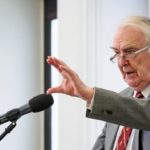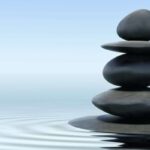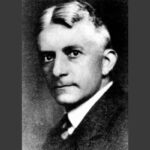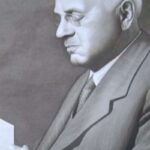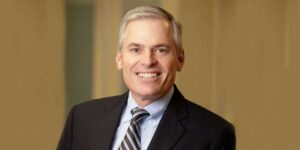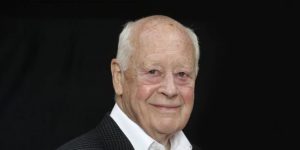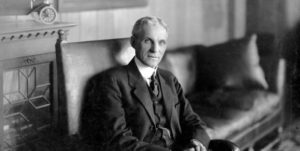Rollo May biography, quotes and books
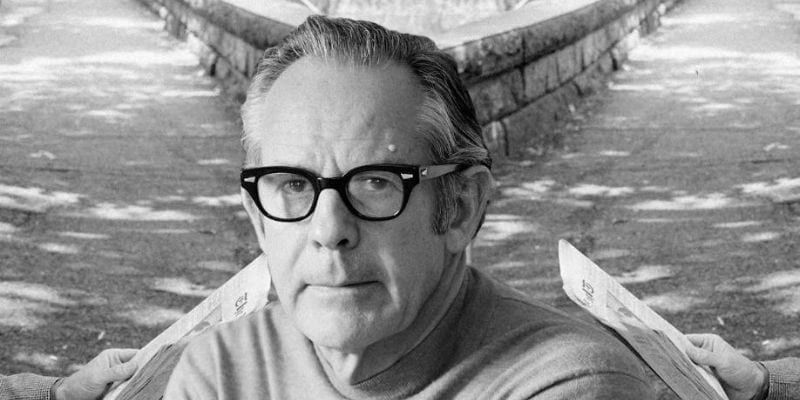
Rollo May (Rollo Reece May, April 21, 1909 – October 22, 1994) was an American existential psychologist and author, known for his influential book ‘Love and Will’, published in 1969. Rollo May played an important role in humanistic psychology and existential philosophy and his significant contributions to existential psychotherapy placed him next to Viktor Frankl.
The biography of Rollo May
Youth
Rollo May was born in Ada, Ohio. His childhood was challenging at times due to his parents’ divorce and his sister’s diagnosis of schizophrenia.
He was the eldest of six children and was given a lot of responsibility because his mother was absent often.
His early experiences made May a leading psychological thinker. Even after his passing in 1994, his writings on personal growth, creativity, existential psychology, and psychotherapy remain relevant, especially with the heightened anxiety brought on by the global pandemic.
Education and early life
May’s fascination with psychology grew out of his tumultuous childhood and the strained relationship between his parents. He attended college at Michigan State, where he studied English, but was expelled due to his involvement with a radical student magazine.
He then received his bachelor’s degree in English from Oberlin College in Ohio. After graduation, May taught English in Salonika, Greece, attending seminars by Alfred Adler, a renowned psychotherapist.
Upon returning to the United States, he earned a bachelor’s degree in divinity in 1938 and briefly served as a minister before enrolling at Columbia College for a PhD in clinical psychology.
Beginning in 1943, May worked as a counselor, teacher, and associate at the William Alanson White Institute in New York City.
In 1946 he set up his own practice. May’s teaching career spanned the period from 1955 to 1975 at the New School for Social Research before moving to California in 1975.
His impactful literary contributions include notable books such as ‘Man’s Search for Himself’, ‘Love and Will’, ‘The Meaning of Anxiety’, and ‘The Courage to Create’. In addition, he co-founded the Saybrook Graduate School and Research Center in San Francisco.
Despite setbacks, including a diagnosis of tuberculosis in 1942 that led to 18 months in a sanitarium, May’s journey through different schools and experiences significantly influenced his future contributions to the field of psychology.
Contributions to psychology
Rollo May made significant and lasting contributions to the field of psychology. He left a profound influence on the understanding of human behavior and consciousness.
A pioneer of existential psychology, May emphasized the importance of individuality, personal responsibility and the search for meaning in life.
With his influential writings, including ‘Love and Will’, ‘The Meaning of Anxiety’, and ‘The Courage to Create’, May explored complex human emotions and the existential dilemmas individuals face. He delved deep into fear, love and creativity, offering valuable insights into the human psyche and the human condition.
May’s work as a practitioner and teacher also played a crucial role in shaping the field. He advocated existential psychotherapy, which focused on helping individuals deal with existential challenges and conflicts in life.
His therapeutic approach encouraged clients to deal with their problems in an authentic way, fostering personal growth and self-awareness.
Famous Quotes
- “A myth is a way of making sense in a senseless world. Myths are narrative patterns that give significance to our existence.”
- “Artistic symbols and myths speak out of the primordial, preconscious realm of the mind which is powerful and chaotic. Both symbol and myth are ways of bringing order and form into this chaos.”
- “Communication leads to community, that is, to understanding, intimacy and mutual valuing.”
- “Courage is necessary to make being and becoming possible.”
- “Courage is not the absence of despair; it is, rather, the capacity to move ahead in spite of despair.”
- “Courage is the basic virtue for everyone so long as he continues to grow, to move ahead.”
- “Creative people, as I see them, are distinguished by the fact that they can live with anxiety, even though a high price may be paid in terms of insecurity, sensitivity, and defenselessness for the gift of the ‘divine madness’.”
- “Depression is the inability to construct a future.”
- “Dogmatism of all kinds… are threatened by the creative freedom of the artist.”
- “Every human being must have a point at which he stands against the culture, where he says, this is me and the damned world can go to hell.”
- “Finding the center of strength within ourselves is in the long run the best contribution we can make to our fellow men. One person with indigenous inner strength exercises a great calming effect on panic among people around him. This is what our society needs — not new ideas and inventions; important as these are, and not geniuses and supermen, but persons who can ‘be’, that is, persons who have a center of strength within themselves.”
- “Fortunately, however, we no longer have to argue that self-love is not only necessary and good but that it also is a prerequisite for loving others.”
- “Freedom is man’s capacity to take a hand in his own development. It is our capacity to mold ourselves.”
- “Good art wounds as well as delights. It must, because our defenses against the truth are wound so tightly around us.”
- “Hate is not the opposite of love; apathy is.”
- “Human freedom involves our capacity to pause between the stimulus and response and, in that pause, to choose the one response toward which we wish to throw our weight. The capacity to create ourselves, based upon this freedom, is inseparable from consciousness or self-awareness.”
- “If you do not express your own original ideas, if you do not listen to your own being, you will have betrayed yourself.”
- “In order to be open to creativity, one must have the capacity for constructive use of solitude. One must overcome the fear of being alone.”
- “Intimacy requires courage because risk is inescapable. We cannot know at the outset how the relationship will affect us. Like a chemical mixture, if one of us is changed, both of us will be. Will we grow in self-actualization, or will it destroy us? The one thing we can be certain of is that if we let ourselves fully into the relationship for good or evil, we will not come out unaffected.”
- “It is an ironic habit of human beings to run faster when they have lost their way.”
- “It is dangerous to know, but it is more dangerous not to know.”
- “It is interesting to note how many of the great scientific discoveries begin as myths.”
- “Love is generally confused with dependence; but in point of fact, you can love only in proportion to your capacity for independence.”
- “Many people feel they are powerless to do anything effective with their lives. It takes courage to break out of the settled mold, but most find conformity more comfortable. This is why the opposite of courage in our society is not cowardice, it’s conformity.”
- “Many people suffer from the fear of finding oneself alone, and so they don’t find themselves at all.”
- “One does not become fully human painlessly.”
- “One must have at least a readiness to love the other person, broadly speaking, if one is to be able to understand him.”
- “One of the few blessings of living in an age of anxiety is that we are forced to become aware of ourselves.”
- “People only change when it becomes too dangerous to stay the way they are.”
- “Real freedom is the ability to pause between stimulus and response, and in that pause, choose.”
- “Recall how often in human history the saint and the rebel have been the same person.”
- “Technology is the knack of so arranging the world that we do not experience it.”
- “The human being cannot live in a condition of emptiness for very long: if he is not growing toward something, he does not merely stagnate; the pent-up potentialities turn into morbidity and despair, and eventually into destructive activities.”
- “The opposite of courage in our society is not cowardice, it is conformity.”
- “The poet, like the lover, is a menace on the assembly line.”
- “The relationship between commitment and doubt is by no means an antagonistic one. Commitment is healthiest when it is not without doubt, but in spite of doubt.”
- “The turtle only makes progress when it’s neck is stuck out.”
- “The ultimate error is the refusal to look evil in the face.”
- “Therapy isn’t curing somebody of something; it is a means of helping a person explore himself, his life, his consciousness.”
- “To love means to open ourselves to the negative as well as the positive – to grief, sorrow, and disappointment as well as to joy, fulfillment, and an intensity of consciousness we did not know was possible before.”
- “What if imagination and art are not frosting at all, but the fountainhead of human experience?”
- “When we are dealing with human beings, no truth has reality by itself; it is always dependent upon the reality of the immediate relationship.”
Books and Publications by Rollo May et al.
- 1950. The meaning of anxiety. Ronald Press Company.
- 1958. The origins and significance of the existential movement in psychology.In R. May, E. Angel, & H. F. Ellenberger (Eds.), Existence: A new dimension in psychiatry and psychology (pp. 3–36). Basic Books/Hachette Book Group
- 1959. The nature of creativity. ETC: A review of general semantics, 261-276.
- 1960. Existential bases of psychotherapy. American Journal of Orthopsychiatry, 30(4), 685.
- 1960. The significance of symbols. ETC: A Review of General Semantics, 301-338.
- 1965. Intentionality, the heart of human will. Journal of humanistic psychology, 5(2), 202-209.
- 1969. Love and will. WW Norton & Company.
- 1975. Values, Myths, and Symbols. The American Journal of Psychiatry, 132(7), 703-706.
- 1979. Psychology and the human dilemma. WW Norton & Company.
- 1982. The problem of evil: An open letter to Carl Rogers. Journal of Humanistic Psychology, 22(3), 10-21.
- 1985. The Wounded Healer. Saybrook Review.
- 1986. Transpersonal or transcendental?. The Humanistic Psychologist, 14(2), 87-90.
- 1989. Existential psychotherapy. Current psychotherapies, 363-402.
- 1990. Will, decision and responsibility.In K. Hoeller (Ed.), Readings in existential psychology & psychiatry (pp. 269–278). Review of Existential Psychology & Psychiatry
- 1991. The cry for myth. WW Norton & Company.
- 1994. The courage to create. WW Norton & Company.
- 1998. Power and innocence: A search for the sources of violence. WW Norton & Company.
- 1999. Freedom and destiny. WW Norton & Company.
- 2005. The art of counseling. Dar El Kalema Publishing House.
- 2015. The discovery of being. WW Norton & Company.
- 1958. Contributions of existential psychotherapy. In R. May, E. Angel, & H. F. Ellenberger (Eds.), Existence: A new dimension in psychiatry and psychology (pp. 37–91). Basic Books/Hachette Book Group.
- 1994. Existence. Jason Aronson.
- 2009. Man’s search for himself. WW Norton & Company.
- 1961. Existential psychology. New York: Random House.
- 1995. The psychology of existence: An integrative, clinical perspective. New York: McGraw-Hill.
How to cite this article:
Janse, B. (2023). Rollo May. Retrieved [insert date] from Toolshero: https://www.toolshero.com/toolsheroes/rollo-may/
Original publication date: 08/15/2023 | Last update: 12/06/2023
Add a link to this page on your website:
<a href=”https://www.toolshero.com/toolsheroes/rollo-may/”>Toolshero: Rollo May</a>


